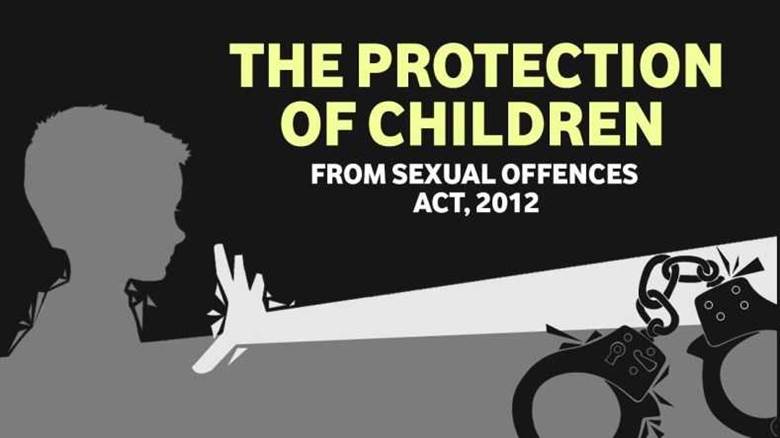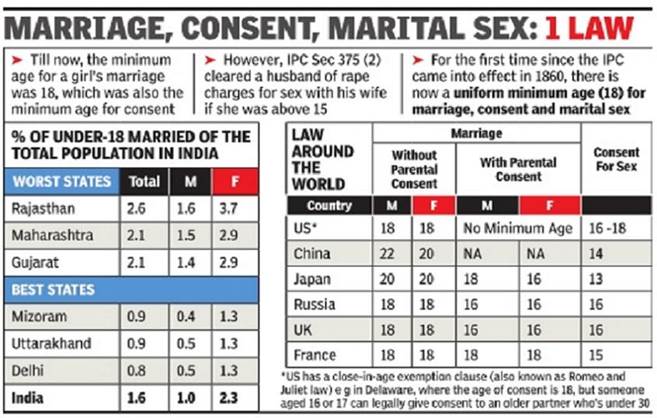Description

Copyright infringement not intended
In News
- While addressing the inaugural session of the national programme on the implementation of the Pocso Act 2012, the Chief Justice of India (CJI) urged the legislature to take into consideration the growing concern around the ‘age of consent’ under the POSCO Act.
- The CJI stated that the state must encourage families to report sexual abuse even in cases where the perpetrator is a family member.
- The CJI said the families of victims hesitate to file a complaint with the police, the slow pace of the criminal justice system is undoubtedly one of the reasons for this but other factors also play a significant role in this.
Related News
- According to data published by the National Crime Record Bureau (NCRB) in 2021; in nearly 96% of cases, the accused was a person known to the victim.
- The analysis “A Decade of Pocso’’ was conducted in collaboration with the Data Evidence for Justice Reform (DE JURE) program at the World Bank.
- It studied 230,730 cases from eCourts in 486 districts across 28 states and Union Territories for the period 2012 to 2021.
- Among the states, Andhra Pradesh shows a huge difference between acquittal and conviction figures with 56.15% of the total disposed cases ending in acquittals and only 7.25% convictions.
- In West Bengal, acquittals (53.38%) are nearly five times the conviction figures (11.56%).
- In Kerala, the gap between acquittal and conviction is not very high with acquittals constituting 20.5% of the total cases and convictions constituting 16.49%’’.
- Delhi has the highest number of POCSO trials with a number reaching 13.54 cases per 100,000 population in 2018.
- Uttar Pradesh has the highest pendency with more than 77% of the total cases filed between November 2012 and February 2021.
- The study found a sharp increase of cases in the number of pending cases between 2019 and 2020 due to the Covid pandemic.
- The study found that on average, it takes nearly 510 days for a case to be disposed of, whereas the POCSO Act has the provision that cases should be disposed of within a year.
.jpg)
Protection of Children from Sexual Offences (POCSO) Act
- The POCSO Act was enacted in 2012.
- It is a gender-neutral act; it also recognizes that boys can also become victims of sexual violence as well.
- It defines a child as someone under the age of 18.
- It also specifically lays down stringent punishment for exposing children to or using them to create child sexual abuse material.
- The law lays down the procedures for reporting sexual crimes against children.
- It places the burden of proof on the accused, following ‘guilty until proven innocent’ unlike the IPC.
- The Act penalizes storage of pornographic material for commercial purposes with a punishment of up to 3 years, a fine, or both.
Challenges with the act
- Lack of complaint: Most of the victims experience terrific social humiliation and feelings of shame and guilt when they report that they are sexually assaulted. It either delays or leaves out a no of victims.
- Lack of awareness: Parents or guardians often do not have the knowledge to safeguard their children either by educating the children about sexual abuse or by being watchful to prevent abuse on their children.
- Poor rate of conviction: POSCO act is plagued by the low rate of conviction. It was 14% in 2014 and 18% in 2018.
- Many states have not complied with the provisions of the act as they have not established special children's courts.
- The act doesn't cover all aspects of the crime against children. It doesn't cover cyberbullying and other types of online crime against children.
- Ineffective training of public prosecutors has often led to the acquittal of the perpetrator.
Age of consent in India
- India's age of consent for sex is set at 18 years under the Criminal Law (Amendment) Act, 2013, regardless of gender.
- In 1892, the marital rape and subsequent death of a 10-year-old girl, Phulmoni Dasi, caused the age of consent to be raised from 10 to 12 years.
- In 1949, it was raised to 16 years after agitation from women's groups about the adverse effect of early pregnancy.
- The Criminal Law (Amendment) Act, of 2013 increased the legally permissible age for sexual consent from 16 to 18.
- Although the Criminal Law (Amendment) Act, of 2013 initially sought to lower the age to 16, it was set at 18 due to political pressure from conservative parties.
- Section 375 of the Act: A man is said to commit "rape" if he has sexual relations with a girl less than 18 years of age with or without her consent.
- POSCO Act, 2012 disallows any such sexual relationships between people under 18 years of age and puts such crimes within marriages as an aggravated offence.
- An exception under the act; According to Section 375, Sexual Intercourse by a man with his wife, the wife not being under 15 years of age, is not rape.
.jpg)
Concern
- The Karnataka High Court said the effect of such criminal prosecution of a minor girl or boy is causing severe distress to all concerned, including the families.
- Sometimes, dissatisfied parents file a case to foil a relationship between two adolescents.
- Misuses by parents to decide who their daughters or sons want to marry.
- The government introduced the Prohibition of Child Marriage (Amendment) Bill, 2021 which seeks to increase the minimum age of marriage for women to 21 years.
- Social activists feel that increasing the marriage age may force vulnerable women to remain under the control of family and social pressures.

Copyright infringement not intended
Way Forward
- More awareness needs to be generated to make more children come forward for their child abuse.
- Proper training of police, forensic staff and public prosecutors need to be put in place for enhancement o the conviction rate.
- The introduction of sex education in schools and educating the children about good touch and bad touch is significant. In 2008-09 Parliamentary committee report mentions the introduction of sex education, but it never materialized. It has to be implemented.
- The Supreme Court issued a direction to set up special courts within 60 days in the districts that are having more than 100 pending POCSO cases. This has to be implemented urgently.
- In 2021, in the Vijaylakshmi v/s State Rep case, the Madras High Court, while dismissing a POCSO case, said that the definition of ‘child’ under Section 2(d) of the POCSO Act can be redefined as 16 instead of 18. “Any consensual sex after the age of 16 or bodily contact or allied acts can be excluded from the rigorous provisions of the POCSO Act.”
- The court also suggested that the age difference in consensual relationships should not be more than 5 years to ensure that a girl of an impressionable age is not taken advantage of by “a person who is much older.”
- The age of consent must be lower than the age of marriage to decriminalize sex among older adolescents to protect them from the misuse of law and harassment.
https://www.google.com/url?sa=t&rct=j&q=&esrc=s&source=web&cd=&cad=rja&uact=8&ved=2ahUKEwiO3JOz7PL7AhVocGwGHYHOAEEQvOMEKAB6BAgIEAE&url=https%3A%2F%2Ftimesofindia.indiatimes.com%2Findia%2Fcji-dy-chandrachud-pitches-for-relook-at-age-of-consent-under-pocso-act%2Farticleshow%2F96139041.cms&usg=AOvVaw2nj5-7d4jB3MJlvO0Sq_aw
https://t.me/+hJqMV1O0se03Njk9






.jpg)








